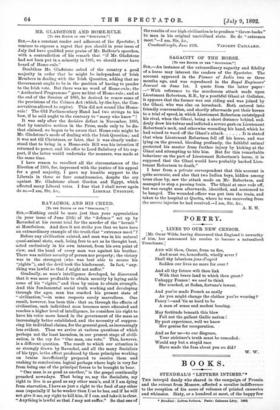RAVACHOL AND HIS CREED. [To THE EDITOR OF THE "SPECTATOR."]
SIR,—Nothing could be more just than your appreciation (in your issue of June 25th) of the " defence " set up by Ravachol at his recent trial for the murder of the " hermit " at Montbrison. And does it not strike you that we have here an extraordinary example of the truth that "extremes meet " Before any civilisation existed, and man was in his natural
quasi-animal state, each, being free to act as he thought best, acted exclusively in his own interest, from his own point of view, and the band of every man was against his brother. There was neither security of person nor property ; the victory was to the strongest (who was best able to secure his ".rights"), and the devil took the hindermost. In fact, "any- thing was lawful so that I might not suffer."
Gradually, as man's intelligence developed, he discovered that it was more profitable to obtain security by laying aside some of his "rights," and thus by union to obtain strength. And this fundamental social truth working and developing through the ages, man has reached his present state of "civilisation,"—in some respects surely marvellous. One result, however, has been this : that as, through the effects of civilisation, each individual man becomes more educated and reaches a higher level of intelligence, he considers his right to have his Voice more heard in the government of the mass as increasingly better established, and the necessity of suppres- sing his individual claims, for the general good, as increasingly less evident. Thus we arrive at various questions of which perhaps not the least harmless, in our present stage of civili- sation, is the cry for "One man, one vote." This, however, is a different question. The result to which our attention is so strongly drawn by Ravachol, and all the many Socialists of his type, is the effect produced by these principles working on brains insufficiently prepared to receive them and rushing to conclusions, logical perhaps where logic is very far from being one of the principal forces to be brought to bear.
"One man is as good as another," is the gospel continually preached nowadays. That being so, say the Socialists, my right to live is as good as any other man's, and if I am dying from starvation, I have as just a right to the food of any other man (especially if he be weaker than I) as he lms, and if he will not give it me, my right to kill him, if I can, and take it is clear. "Anything is lawful so that I may not suffer." So that one of the results of our high civilisation is to produce " throw-backs " to man in his original uncivilised state. So do "extremes Meet."—I am, Sir, &c.,


















































 Previous page
Previous page